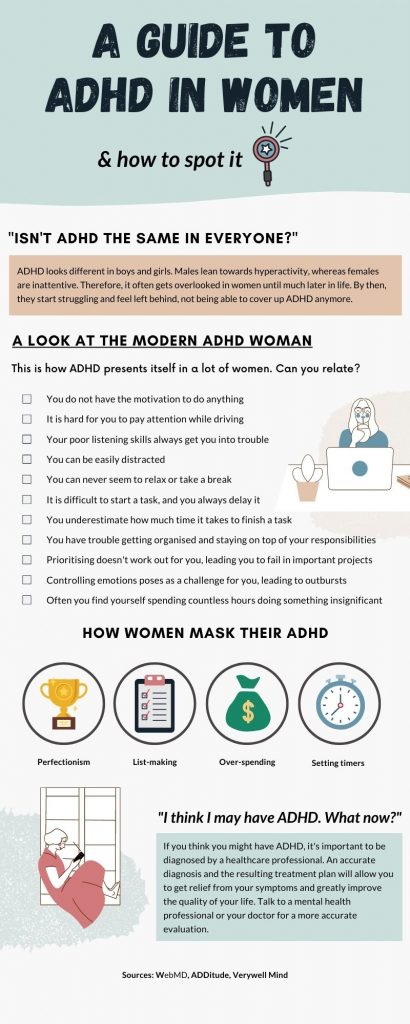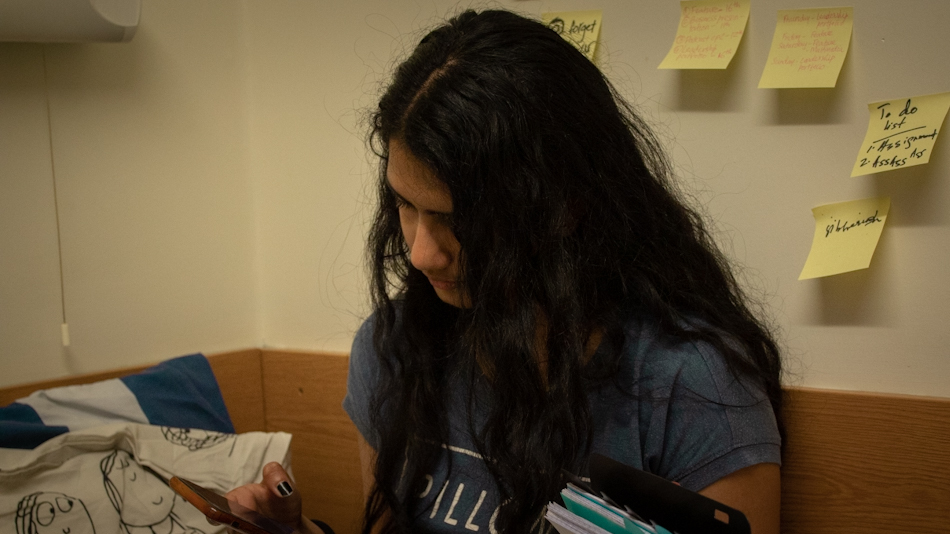Women with depression are struggling with undiagnosed ‘attention deficit hyperactivity disorder’. Is enough being done to look after them?
The sun shone through her apartment window as she lay in her bed with her cat. A hundred thoughts raced past Lucy Brown’s mind. She had to buy her anti-depressants, look after her cat who just had a surgery, and sort her students’ problems out. But all she wanted to do was continue lying in bed with her mind at peace for once.
For as long as Lucy can remember, she has had trouble focusing on one thing at a time. The pastoral coach had an underlying feeling that it was more than just depression, something she has lived with since she was 16. Ten years later, she finally had an answer – it was ADHD.
“I always knew there was something,” says Lucy. “I always felt, why do I have this sadness? It came from very low self-esteem, low confidence, and feeling like something was wrong with me, but nobody else could see it. When I look back now, I think it’s because I was masking my ADHD symptoms.”
Lucy’s story is not an isolated one. Many women struggle with lack of attention, impulsive behaviours, and trouble concentrating – all symptoms of ADHD. Depression makes this condition worse.
I wish somebody had seen this when I was 16. My life would have been very different.
Lucy recalls her time in college when she would struggle with assignments. “I would get so overwhelmed and struggle to focus and just leave it till the last minute,” she says. “I would see everybody else doing well around me and think, why can’t I do that? What is wrong with me? I think that is where depression and anxiety come from. It’s all linked together.”
Though more common in children, ADHD also affects adults, which often goes undiagnosed. A US-based study from 2016 claims that other mental health disorders mask ADHD in adults, making it difficult to recognise.

“When I would have those depressive episodes, there was an element of burnout as well, just not being able to hold everything together,” she says. “I’d never even considered ADHD.”
Recognising ADHD is as difficult for other women as it is for Lucy. A recent study by Cardiff University found that about 13 percent of women with depression have ADHD symptoms but no clinical diagnosis for it.
Rachel Morgan-Trimmer, a neurodiversity consultant, believes that this lack of diagnosis exists because women’s health isn’t taken seriously. “There’s no inherent drive to deal with our issues because we keep them to ourselves,” she says.
“A mentally ill man with ADHD might be getting in fights or causing damage – he is loud and has a problem, so he gets attention. An ADHD woman who is depressed is more likely to be at home feeling guilty about all the ways she thinks she has failed. It’s something I see a lot,” says Morgan-Trimmer.
Lucy shares this similar feeling where everyone around her refuses to acknowledge her condition. It took her almost a decade to come to terms with ADHD, especially since her mental health struggles were often dismissed as depression and anxiety.
When her best friend took a course on adults with ADHD, she saw the similarities between her experiences and other women who have dealt with mental health issues all their life. “My best friend that I’ve known since I was really young said, ‘I really think that you might have it’. And then I read articles of the women’s stories, and I was just like, this is me.”
However, ADHD and depression often overlap. A 2017 report found that about one-half of adults with ADHD also have severe depression. This means that on a good day, it can mean Lucy’s sensitivity helps her make new friends and be more understanding. She says, “I can be with somebody for ten seconds, and already picked up what kind of people they are because I am very good at empathising with people.”
But on a bad day, it is the constant need to question everything around her. “I always feel like I have forgotten something, even when I haven’t,” Lucy says. “One of the biggest issue is not being able to relax and being quite restless. And my mind being constantly on the go. I struggle to be present in the moment.”
Over time, the definition of ADHD has significantly evolved. Earlier, the American Psychiatric Association associated it with emotional imbalance. Surprisingly, there are no mentions of the emotional side of ADHD in the current diagnostic criteria. This has been debated by several professionals, who believe that it should be included.
Neil Peterson, a columnist on ADHD experiences, writes, “If around half of people with ADHD, give or take, have especially pronounced issues with emotional regulation, that’s a wake-up call that issues with managing emotions need to be considered as an ADHD symptom.”
Lucy found out about this when she was in the middle of her ADHD self-assessment. “Emotions are not mentioned at all when you tick off your symptoms,” she says. “There is nothing about it. I had to read up on it myself.”
This wasn’t the only thing Lucy discovered — she was diagnosed with combined ADHD, which is a mix of hyperactivity and impulsivity. However, she was not expecting this, as she is not the stereotypical ‘running around doing chores all day’ kind of a person.
“I think it’s just the perception that you have of hyperactivity, it’s different,” she says. “I always thought, well, I’m not physically very restless. But it was mental hyperactivity. You don’t think about that, do you?”
ADDitude describes the ADHD diagnosis process as “fuzzy” because a blood test or scan cannot detect it. Instead, it involves routine visits to the GP, clinical interviews, a medical exam to check for other mental health disorders, and extensive paperwork.
The interview gathers the patient’s strengths and weaknesses by exampling different symptoms. “So, it would be – interrupting people, and then you’d have to give examples from your childhood and adulthood. That was for each of the symptoms,” says Lucy, who did her assessment over a video call.

While the ADHD diagnosis came as a relief, the diagnostic process is the hard part. Lucy’s journey was particularly challenging, as nobody recognised her signs of discomfort. Her doctors were dismissive and misinformed, so she had to use alternate services online to find support.
“It was quite hard, because even the GPs, they didn’t know or even really understand anything about ADHD in females. There was a real lack of knowledge, even from the people you would expect to have information,” says Lucy, who then asked her GP to get her assessed through Psychiatry UK.
But is there an answer to this issue? Morgan-Trimmer believes that every woman with depression should automatically be screened for ADHD. “Almost every woman I have spoken to about their adult diagnosis has suffered mental health issues before getting an ADHD diagnosis, sometimes quite severely. So we need to tackle both at once.”
The NHS states that treatment for ADHD and depression involves the right combination of dosage and medication, along with therapy. For Lucy, anti-depressants have helped, and soon, she will start her ADHD medication, which she is quite nervous about.

Even then, Lucy wishes things were a little different in her adolescence. “I wish somebody had seen this when I was 16, because my life would have been very different. I had to fight all by myself. It is a blessing that I am still here,” she says.
Her path to recovery has not fared well because of the social stigma attached to ADHD. She says, “I have had people question it and it’s very hurtful because they don’t know how you feel. A lot of it is not about how I come across to people. It’s about how I feel on the inside, how I am suffering. But people seem to not understand it because they can’t see it.”
As a consultant for others and a patient herself, Morgan-Trimmer thinks that people need to be more supportive of those with mental health conditions. She says, “We might not know if someone is depressed or has ADHD. Being supportive of friends, colleagues and family members who have ADHD or depression can go a long way towards helping recovery.”
Lucy hopes to move forward in a world with more understanding and awareness of women with ADHD and depression. “A couple of people have laughed at me when I said I have a diagnosis,” she says. “I don’t tell many people because of that. But then, it tends to be older people. If I talk to my students about it, they are very accepting, like, ‘Oh, that’s cool’. So maybe there is a change coming.”

